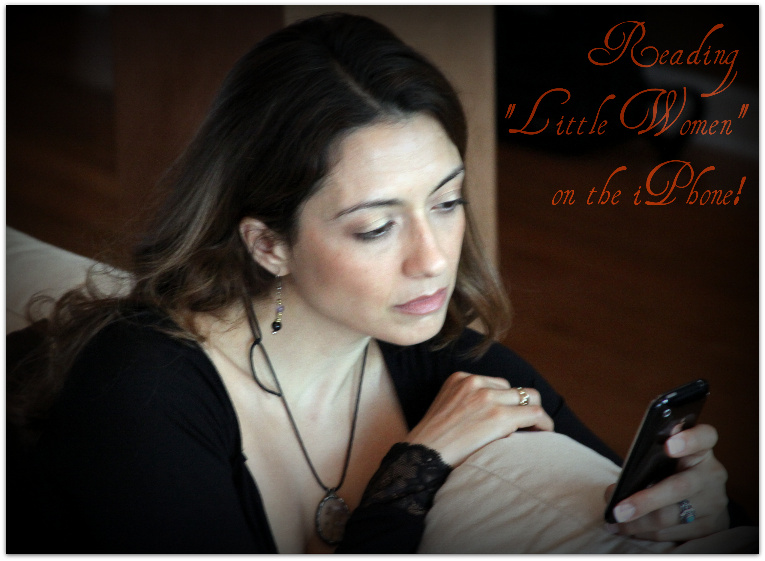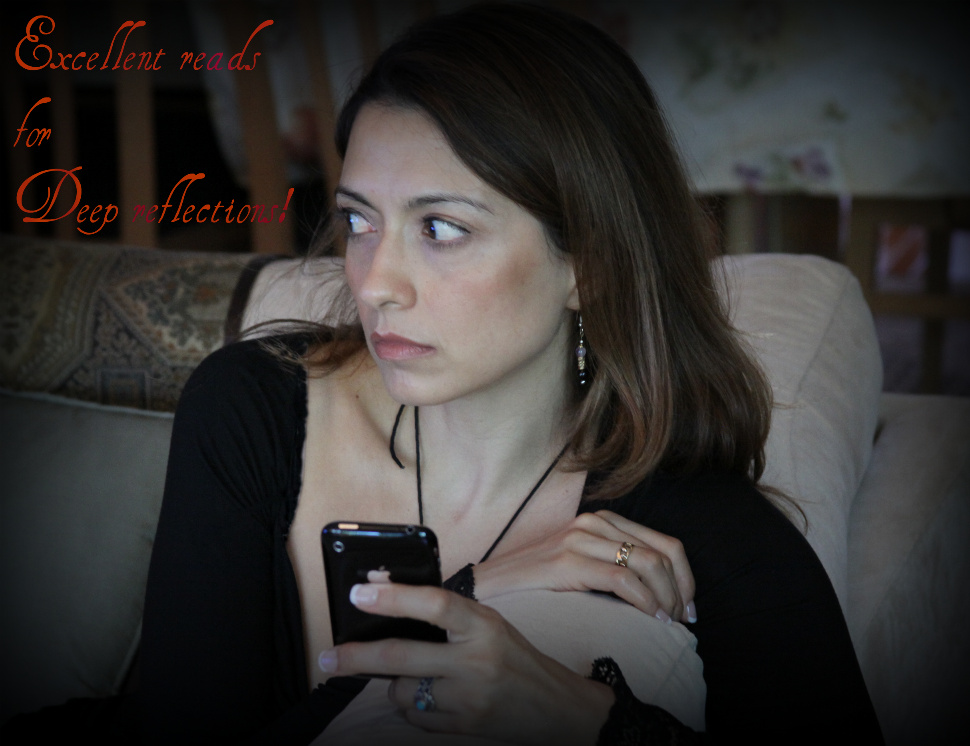
I did not expect to find so much lasting imagery from Louisa May Alcott’s beautiful “Little Women“:
The sisters writing plays and acting them out loudly up in their attic.
Mother coming home to 4 overjoyed girls who hang on her every word and move.
The sisters packing up their Christmas breakfast – tea and hot water included – and taking it for the desolate family next door.
The Pick Wick Paper, their own creation, newspaper layout complete with advertisements and articles.
Jo writing her novels with a pen and ink, the not-so-long-ago days even before the typewriter and the joys of writing on paper.
Laurie proposing to Jo and his bitter shock when she refuses him.
The rush of grief, emotion and anguish from loss of a sister which compel Jo to write her greatest novel yet.
I have been on a voracious consumption of the classics for over a year now, a journey of getting to know oneself as much as indulging in exquisite writing and storytelling, but after Alexander Dumas’s epic masterpiece of “Count of Monte Cristo”, a lighter reading was in order. When I held the book contest in February, one of the contestants, Stacey, suggested this book as her most favorite, one that made her set aside pre-teen paperbacks and taught her to embrace the classics. Stacey’s recommendation was plenty to convince me but it just so happens that “Little Women” was both a classic and listed in the top 100 novels of all time (many such lists on Google but if the list excludes Hugo, Dumas, Tolstoy, Austen, the Brontë sisters, Henry James and Ayn Rand, I’d look for another list if I were you!). While it would be impossible to ever leave the 1800s if I continue to stubbornly choose the classics of the era, I could not wait to bask in the stories of Meg, Amy, Jo and Beth.
There is something alluring and engaging when the first chapter of a novel starts in a cold winter. My own temperament is neither made nor able to be trained for cold weather. I shiver even in a mild wind sometimes and yet I crave reading about my characters bravely battling a brutally cold winter, especially when the setting takes us to Concord, Massachusetts in late 19th century civil-war era America. Harsh and gloomy as the weather may be, the bleak of winter is no match for the warmth which stems from love, happiness, and tightness of the March family. Four sisters, one mother, one nanny, and a father at war, Alcott introduces us one by one to the March sisters and the bond of sisterhood which is tested, broken and mended again and again throughout the novel.
The theme and plot of this novel paint the pictures from every day life for an ordinary family. The hardships of Civil War and near-poverty, while real for the March family, are not central to the plot and so “Little Women”, which has many important messages, comes across as extremely light, fun and beautiful reading. I can even attest to it being a children’s classic and shamelessly admit that I enjoyed it thoroughly.
Sometimes we read for the sake of reading, so ingrained is reading in our life. The habit of reading can overtake the questions we should ask before embarking on a new book. Should we pause and ask why we are reading a story, an article, a blog post, a book, a newspaper or magazine every single time? Probably not. We read for the sake of reading, consumption of information, entertainment, thrill rides, humor, news, being in the loop with society or just for passing time. Sometimes, there is no necessity for a purpose, a goal in mind, or a milestone to reach at the end of a reading journey for reading alone has its own rewards.
Reading is the best pastime for an active mind! If you like to see the other book reviews, check the index of In Print.
With “Little Women”, I took this nonchalant relaxed approach to reading a light classic, something I rarely do as books are a great investment of time and effort. And yet my purpose found me in the midst of this story. I aimed for only entertainment, feel-good story of March family and great lessons still came to surface in the trials and tribulations of the sisters.
The 19th century society’s lack of regard for women’s education and rights aside, I focused instead on which of the March sisters I should have played in Orchard House: quiet Beth, romantic Amy, practical Meg or tomboyish, temperamental, rambunctious Jo. Without a question, I would have made an excellent Jo. Josephine March, a name I have long adored, is the protagonist and it is her character which comes of age most beautifully, her duckling which turns into the most stunning swan, and her heart which goes through most heart-ache, hardest growth, and most bitter-sweet lessons of life.
It is through Jo that …
…we see what regrets short temper can bring about and how to channel that energy to good use.
…we watch how to deal with the loss of a sister and the abandon of a best childhood friend.
…we wonder what magic we can create if we write from the heart and what rubbish when we write forced with another agenda.
…we learn how much comfort maternal love can afford us in desperate times.
…we believe that age difference and cultural gaps are no strike against a love story.
We are as lucky in print as we are on the screen when it comes to “Little Women”. The 1994 movie adaptation is exquisite and stays very close to the plot; it is almost (but not quite!) as good as the magnificent 1995 “Pride & Prejudice” movie adaptation. For me, staying close to the book plot is essential and yet Whispering Gums wrote an interesting post about a unique take on movie adaptations.
The Prolific Living book reviews would be remiss if I did not share a short list of my favorite quotes, always in hopes of aspiring you to read more and read the classics. Reading a good classic is akin to reading 100 self-improvement blogs in one sitting; it renews and refreshes what you already know in such memorable prose that only your stubbornness can trick you to forget it and return to poor old habits so take heed:
““My lady,” as her friends called her, sincerely desired to be a genuine lady, and was so at heart, but had yet to learn that money cannot buy refinement of nature, that rank does not always confer nobility, and that true breeding makes itself felt in spite of external drawbacks.”
“If ‘genius is eternal patience’, as Michelangelo affirms, Amy had some claim to the divine attribute, for she persevered in spite of all obstacles, failures, and discouragements, firmly believing that in time she should do something worthy to be called ‘high art’.”
“Mrs. March knew that experience was an excellent teacher, and when it was possible she left her children to learn alone the lessons which she would gladly have made easier, if they had not objected to taking advice as much as they did salts and senna.”
“Wealth is certainly a most desirable thing, but poverty has its sunny side, and one of the sweet uses of adversity is the genuine satisfaction which comes from hearty work of head or hand, and to the inspiration of necessity, we owe half the wise, beautiful, and useful blessings of the world.”
“Watch yourself, be the first to ask pardon if you both err, and guard against the little piques, misunderstandings, and hasty words that often pave the way for bitter sorrow and regret.”
“But young as she was, Jo had learned that hearts, like flowers, cannot be rudely handled, but must open naturally,”
“Love Jo all your days, if you choose, but don’t let it spoil you, for it’s wicked to throw away so many good gifts because you can’t have the one you want”
“But someone did come and help her, though Jo did not recognize her good angels at once because they wore familiar shapes and used the simple spells best fitted to poor humanity.”
“Little they cared what anybody thought, for they were enjoying the happy hour that seldom comes but once in any life, the magical moment which bestows youth on the old, beauty on the plain, wealth on the poor, and gives human hearts a foretaste of heaven.”

 I am Farnoosh, the founder of Prolific Living. So glad you are here. My mission is to empower you to unblock your creative genius to live your dream life.
I am Farnoosh, the founder of Prolific Living. So glad you are here. My mission is to empower you to unblock your creative genius to live your dream life.